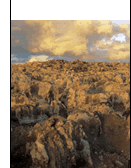

 |
|||
|
Paradise for Sale Page
2 Several
years ago a young woman about to take my introductory biology course
said, “I’m a creationist. Do you teach biology as if evolution
were true?” I agreed. Each of us has a capacity to hold and act upon our beliefs, even though they may be demonstrably false. Often we are naïve, but more telling is the fact that we do not necessarily alter our beliefs when exposed to overwhelming evidence that contradicts them. This phenomenon helps explain why our society denies both the importance of the Nauru experiment and our own environmental conundrums. Our brains did not evolve to understand biology or to accept the evolutionary processes that led to life on Earth. Yet, without an evolutionary perspective, what we know about life makes little sense. Before the development of science, humans knew little about the freestanding reality that exists outside the human brain. Consider,
for example, the electromagnetic spectrum that is used to classify
radiation by wavelength. Wavelengths span from less than 0.000000000001
meters to more than 100 meters. For almost all of the several hundred
thousand years that our species has existed, humans knew only about
wavelengths visible to the human eye. Radio waves, microwaves, ultraviolet
rays, and x-rays existed, but our senses couldn’t detect them.
So,
because our early ancestors were unable to explain how the world
worked from a scientific perspective, they dreamed up explanations,
even though they had no reliable way of proving them. Their explanations
came to life in stories, which were woven together by various cultures
to create worldviews. These views then guided the culture, instructing
its people about right and wrong and how to live. Unfortunately,
almost everything our pre-modern ancestors imagined about the physical
and biological world was wrong. Even today, humans (whether by design
or need) create fantasy worlds estranged from biological and physical
reality and accept them as true. Mass
extinctions and recovery periods are times of biological chaos and
ecological instability. Life support is in constant flux. These
conditions are not suitable for maintaining huge populations of
large animals, especially those at the top of the food chain. In
a nutshell, our speeding up of extinction is incompatible with durable
habitation. Nobody, however, knows how much or which parts of biodiversity
we need to preserve our civilization. The biosphere and its ecosystems
are immense, complex, adaptive systems that are beyond human capacity
for prediction. We face a similar predicament with climate change. We know that our activities are major contributors to the increase in greenhouse gases. These changes will increase heat retention and likely deplete biodiversity and devastate human activities. But nobody can predict how much change the atmosphere can endure before major, irreversible climate change becomes inevitable. Prudence and wisdom suggest that we stop our global experiments with life support and climate, but these are not the principles that guide our civilization. In practice, prudence and wisdom are elusive because our highly diverse species is collectively not as logical nor as reason-based as we think we are. Within our brains lies a hodgepodge of logic, nonsense, passion, and reason struggling to make sense of incomplete and often contradictory information. To make matters worse, humans have the unbridled ability to dream up missing pieces of information. We then believe our fantasies, even to the point of sacrificing our lives. Much like in our ancestral times, this can lead to incorrect worldviews. This aspect of human behavior—to create and act upon our beliefs—will not change; it holds deep evolutionary roots. But our culture must alter its beliefs and fantasies if we are to create durable patterns of human habitation. As the Nauruan experiment established, we have to move away from our economically centered perspective toward a new, biologically based worldview, in which our primary goal is to live responsibly and compatibly with ourselves and the rest of life. Is this realistic? A Polynesian culture on the island of Tikopia did change from a pattern of environmental destruction to one of sustainable habitation, but I don’t know if this is possible on a global scale. I do know that if we are unable to arrive at some consensus about the severity of our environmental problems and their causes, then collapse is certain. Education will be a critical component in this cultural transformation, if it is to take place. This is merely a glimpse of our tendency for fantasy and its role in preventing us from acting decisively on the mega-trends that will undo civilization unless they are reversed. However, the environmental agenda includes the entire range of human activities; therefore, everything we do is potentially part of the solution. Every aspect of what happens in a home, school, or a place of work is relevant. Clearly, addressing in a meaningful way Oberlin’s traditional concerns of equity, fairness, social justice, and respect for diversity is utterly dependent upon our resolving environmental problems. Carl
McDaniel is a professor of biology at Rensselaer Polytechnic Institute
and co-author of the book Paradise for Sale: A Parable of Nature. |
|||||||||||||||||||||
|
back to top |



